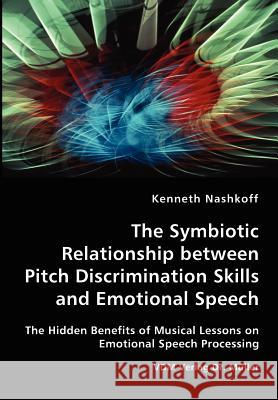The Symbiotic Relationship between Pitch Discrimination Skills and Emotional Speech » książka
The Symbiotic Relationship between Pitch Discrimination Skills and Emotional Speech
ISBN-13: 9783836427128 / Angielski / Miękka / 2007 / 72 str.
Previous research indicates that a relationship between music lessons and speech prosody skills exists. Speech prosody, like music, uses variations in pitch, tone, and volume to add an emotional content to communications. Studies suggest that musical training transfers its effects into speech prosody skills. The relationship between the pitch discrimination skills used in music training and speech prosody has largely been unexamined. This book examines the hypothesis that differences would be found in the pretest and posttest prosody skills of a treatment group which received pitch discrimination practice. Music majors received eight weeks pitch discrimination practice and were given a pretest and posttest to assess pitch discrimination and speech prosody decoding abilities. A control group was also pre tested and post tested on their speech prosody skills. The Comprehensive Affect Testing System recorded speech prosody skills, and pitch discrimination testing was recorded. Results of data analysis support the hypothesis that pitch discrimination practice does transfers to speech prosody decoding skills. Such transfer may be a hidden, unexplored benefit of formal musical lessons. From a perspective of social change, this strongly suggests that such a nontraditional and short-term pitch discrimination practice intervention can improve emotional speech decoding skills. Increasing prosody accuracy benefits professionals and all who depend upon accurate interpretation of interpersonal communication. The implications for communication improvements through a practice mode of musical ear training has unlimited potentials.Kenneth Nashkoff has been a professional musician for over twenty years, composing music and working with various ensembles.With a Ph.D in Psychology, and years of experience as a working musician, the relationship between music and emotions is explored in this book.











